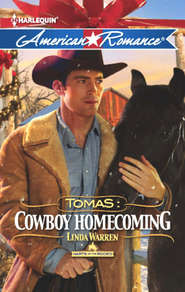По всем вопросам обращайтесь на: info@litportal.ru
(©) 2003-2025.
✖
A Texas Family
Автор
Год написания книги
2019
Настройки чтения
Размер шрифта
Высота строк
Поля
“I know we talked about her doctor visits. Is there nothing else he can do?”
Hil shook her head. “He said severe trauma from the murders has altered her personality, and dementia has set in, but I know her moods. We’re okay.”
The bucket caught Jena’s attention. “I hate to sound critical when I’m so appreciative, but what happened to the money for the roof?”
“Oh, that. Don’t get upset. Wait till you see.”
Jena followed her sister through the kitchen and suddenly stopped. There was a utility room off the kitchen—a bright cheery room painted a soft yellow with a white washer and dryer. One wall had a mural of a rainbow, clouds and birds.
Jena was speechless.
Growing up, they hadn’t had a washer or a dryer. On Saturdays, they usually went into Dripping Springs to a Laundromat. But if they didn’t have money, their mother washed their clothes in the bathtub—a backward way of life for the poor people who lived across the tracks. A stigma that would be with her for the rest of her life, as would so many other things from her childhood.
“You built a utility room?”
“Fresh, isn’t it?” She pointed to the mural. “It would have cost more money to put a window in, so I painted a scene to liven up the place.”
“Who built this?”
“The guys. I bought all the supplies, and they did the rest.”
“What guys?”
“The ones who come into the café: Billy Jack, Clem, Bobby Joe, Bruce, Lenny and...”
“The labor was free?”
“Yes. Bruce is a carpenter, Lenny a plumber, Clem a Sheetrock guy, Billy Jack a painter and Bobby Joe a roofer. They had it up in two days.”
“For free?”
Hil grinned. “I just promised to cut their piece of pie a little bigger at the café. They’ll do anything for an extra piece of pie.”
Jena believed they did it for Hilary. She had a way with people.
She looked at the white ceiling. “I’m assuming this has a roof on it.”
“Of course.”
“Then why didn’t you roof the whole house?”
“Well—” she tilted her head slightly “—I ran out of money. I can get the guys to do hard labor, but I can’t get them to fork over any cash. So Bobby Joe put tar on it, and he’s coming back to repair that one spot that’s still leaking.”
“If you’re happy...”
“I am.” She did a dance, swung around in a quick move and did a ta-da with her hands pointed toward the washer and dryer in a typical Vanna White gesture. “I can wash clothes anytime I want. I feel empowered.”
Jena laughed, something she hadn’t done in a long time, but in her heart she felt guilty. She had those conveniences in Dallas and more, while her mother and sister lived in poverty. While she was here she would try to improve things as much as she could.
Arm in arm they walked into the kitchen. Their mother sat at the table, staring off into space, her food barely touched.
Hilary went to her. “Hey, Mama, why aren’t you eating?”
“What? Oh.” Norma looked up, her eyes blank. “I’m not hungry. You can—” She stared at Jena. “What are you doing here? You have to go. They’ll hurt you. C’mon.” She stood up so fast the chair went flying into the stove.
Hilary immediately hugged their mother, motioning for Jena to go into the other room. Her legs trembled, but she did what her sister asked.
“It’s okay, Mama,” Hil was saying. “A little nap and you’ll feel much better.”
“Why do I keep seeing her?”
“Because you’re worried about her, but Jena is fine. Remember I told you she’s coming for a visit.”
“No. They’ll hurt her again.”
“That was in the past. Things are different now.”
“I’m so cold.”
“Lie down and I’ll get a blanket.” In a few minutes Hilary was back in the living room.
“Is she always like that?” Jena asked.
“It comes and goes. Today’s a bad day. She’ll wake up and be almost normal. It’s strange.”
“She shouldn’t be left by herself.”
Hilary shrugged. “I don’t have much choice. I have to work, but I check on her all the time. It’s not that far to the café, and the good thing is she won’t leave the house. This is familiar, and if I force her outside for fresh air she gets all nervous.”
“We have to talk about this, Hil.”
“I’m not putting her in a home,” Hilary said with a stubborn lift of her chin.
Jena didn’t want to do that, either, but they’d have to have a serious conversation soon.
“Enough with the depressing thoughts.” Hil jerked off her boots and socks. “I want to try on those shoes. Off with them.”
Jena smiled and really looked at her sister’s attire for the first time. She wore a denim skirt that flared out around her thighs, a red-and-white-check blouse and cowgirl boots with red tops. Bracelets dangled on her wrist; large silver earrings hung from her ears. She looked as if she was going square dancing.
Undoing the tiny strap around her ankles, Jena said, “Love the outfit.”
“I make sure no one forgets me.” Hilary slipped on the four-inch heels. “Wow.” She tottered across the living room and then mimicked the walk of a runway model, tripped and fell onto the sofa, laughing. “How do you walk in these things?”
“You get used to it, and I have to dress nice for my job.”
“Oh, yeah, the big attorney.”
Jena didn’t miss the sarcastic tone. “He’s been nice to me, Hil.”











